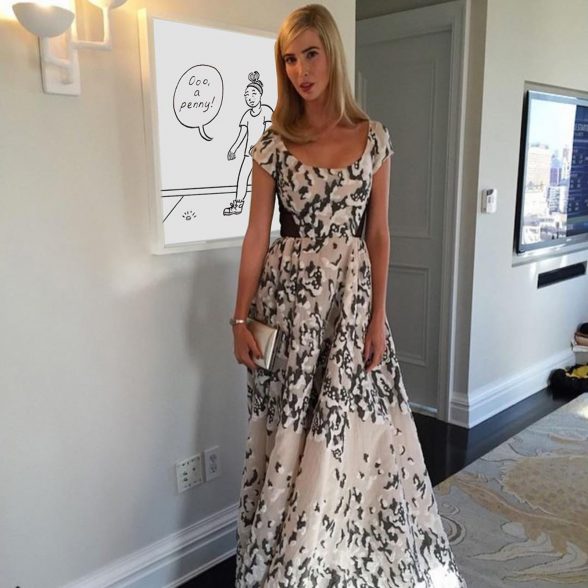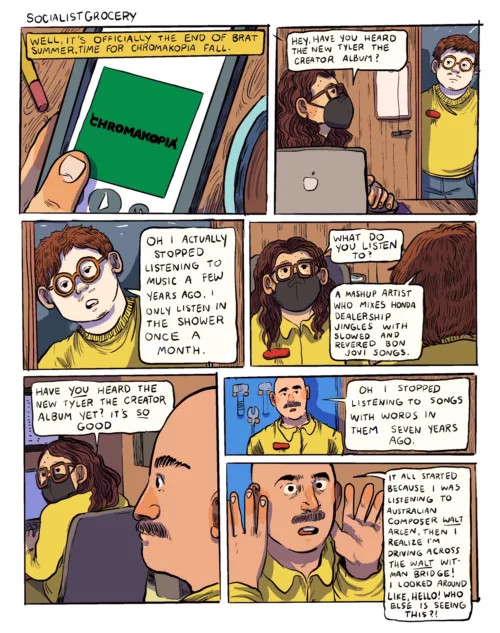
Dear Artblog,
Back in the 90s, we used to talk obsessively about artists selling out. Nowadays, the culture has shifted, and we seem to encourage it – artists SHOULD get paid for their work, or why not get paid for your work? As an artist in 2018, should I be concerned anymore about selling out?
-Anonymous
Well, Anon, one thing that will never change is that the price a person pays for fortune and fame is entirely up to the person. The sellout scale is personal. We all need to take care of ourselves. Now onto my personal opinion and, figure of speech, did you ask the wrong person!
Yes, artists should get paid for their work. Yes, an artist should be concerned about selling out. Artists have always been concerned about this and now, more than ever, they should be due to the disparity of wealth in our country. Getting paid and selling out are two different things. One advantage I have, cleaning houses for a living, is a clean conscience. It’s an honest days work. The Earth is dying. Trump is President. Ideologically, I have high standards; a sellout is not a real artist in my book.
Speaking of books, I blame reading the “Letters of Vincent Van Gogh” in high school for the depths I’m willing to go to call someone a real artist. I started art school in 1999 determined that artists like Van Gogh, Millet, Courbet — all painting under the banner of Realism, rejecting Romanticism, upholding the worker in their paintings as beauty sans, I don’t know, women in swings — were real artists, revolutionaries even. Being an artist was more than a profession, it was a religious calling. I somehow overlooked how all the letters started “Dear Theo.”
Today Van Gogh might not be any better than a Long Island trust fund baby transplant living in Brooklyn, graduating from art school after paying $100,000-$120,000 (not including all those expensive art supplies and NYC rent), vying for gallery representation before the age of 25 22 (have to get into that top ten artists under 30 at 25 editorial). Van Gogh almost was a sell out, but he died before he sold anything. Maybe all real artists die before selling out? Perhaps that’s a little too romanticized — let’s get real.
Art is not that cool, it’s a lot like show business. I’m willing to go out on a limb here and say that all of art history is just a bunch of posers.
We can’t all come from inherited wealth, though the majority of us did. Artists getting fairly paid during The Great Depression was all the rage, with the WPA’s Federal Art Project (Yay, New Deal). But do we really want Government sanctioned art? If you take a look at the artists who benefited from this money I would say, yeah sure. If I were alive in 1935 tho, I would definitely be calling them fake posers. And today? Please do not go to the NEA’s website. It’s depressing.
The love of money is the root of all evil. Let’s not make money evil, let’s do good things with money. Grant money comes from wealthy people who probably got that money from oil (*whispers* that’s where a lot of rich people get money). Remember I said the Earth is dying and receiving money from things that make the Earth die means the Earth dying is your fault.
The main problem with grants is that in order to get the grant, you have to be like the grant. There are a number of sellouts I know who write the narrative of their artwork to fit a grant. Admittedly, I’m tempted, but no. I might start believing the lie. Again who are you making art for? The public? Or grants? Or an oil company? Maybe there’s a grant that is actually just for you. It’s a slippery slope. (Cut to Jeff Koons ringing the NASDAQ Bell *barf*.)
You want a gallery to sell your paintings to wealthy people who see your art, ART, as nothing more than an investment to be traded to the highest bidder at the whim, WHIM, of a market that trades art based on a value system of dollar bills. That’s gross. No philosopher on aesthetics ever has attributed beauty to the dollar bill (technically), so how is this possible?
How about gallery representation or joining a coop gallery? A gallery will want you to be putting out a consistent product. Art is not a consistent product. I’m pinpointing galleries with price points starting at unaffordable to the average person. Art institutions (like non profits, k?) which pay artists to have shows where the object is not entirely to sell the art – that sounds cool. In reality artists as activists have been organizing over time for artists to be fairly and equally compensated – because that’s been a problem in these situations. It’s all about getting paid.
Today there’s W.A.G.E. Working Artists and the Greater Economy. I recommend checking out their website for standards in practice in compensating artists. There have been other movements throughout art history to this point and damn this blog post is long.
As a curator organizing within my own budget I’ve often not paid artists. I regret not asking for money to pay for artists in my shows, making that a point to everyone who came to the exhibition. It’s not realistic and makes it seem like we’re operating under some kind of utopia, which is far from the truth.
Having art spaces where selling something is not the point, but expression, experimentation, and conversation is, is not selling out — though curatorial nuance can take us to sellout territory. Not paying artists at artist-run spaces, non profits, and 501(c)(3) s is like being an art slumlord (cc Maria Bamford’s commencement speech at the University of Minnesota).
How about being an art teacher? Some artists actually are great teachers and should be doing this. Someone has to teach artists, but the majority of teachers in art school are actually the worst teachers you will ever have in your life. It’s bottomline a way for them to make a decent living that isn’t manual labor.
Art schools take money from a great number of students who will not be able to make a viable living to pay back their student loans when they graduate. I would say that I have a rebellious spirit that makes me nearly unemployable, but I am living proof. I am 36 years old, in student loan debt and have nowhere near twice my meager salary saved up for retirement. There simply is not enough of an art market (cause all those famous artists take all the money, am I right?) to employ all the artists who are graduating from art school. Not enough teaching jobs for artists either.
Art schools take advantage of adjuncting professors who often dominate the permanent teaching staff; they are paid poorly, inconsistently staffed and have no benefits. There are unions being formed across the U.S. for adjuncts. I opt to not be a part of the whole thing. Don’t be mad at me, I’ve taught at art school, once.
At this point, you should understand that I think sellouts are (non)artists who receive money from privately funded grants, government funded grants, galleries, art schools and art institutions. How the hell is an artist supposed to make money? Patreon. Sign up today! *link in bio* (pretend it’s not a wealthy person’s startup)
Here’s what I think your question is getting at in terms of the culture shift. An honest living is: sell your art to your friends or end up having to live with Ivanka Trump owning your artwork. By today’s standards, I have 974 (14 of them are patreons) friends who should be paying me to make my art. Yeah, I’m not Instagram famous either. The difference between the art world today and getting checks from your dear brother Theo is the Internet. “Dear Internet, Thank you for the oil paints. And now I will go into a molecular break down of nature in landscape. Love, Beth”
Use the Internet, reach out to people who show an interest to your artwork. Ask for a dollar. Artists, we need to change people’s minds on how the art market should work. Don’t let haters tell you you’re self-entitled. Crowdfund through Kickstarter or Indiegogo or Gofundme or Patreon subscriptions or social media. Paypal.me (Let’s ignore Elon Musk for the time being? I don’t know. Maybe we shouldn’t.) Only the bourgeois will complain, f*** em’. Use whatever platform you feel most comfortable using. If you make art objects, set up an online shop. I use storenvy. I’m actually not against art fairs, locally. (Have you been reading this? Artists do not sell art to the 1%)
Imagine a world where artists can make art for a living based on a social responsibility in relation to the needs and desires of their community and the planet Earth.
Pay your taxes, artists. This hussle to crowdfund seems harsh, like I’m promoting the gig economy. Ew. I’m not. I want us all to have stable jobs, health insurance, retirement plans — all while being artists. I wish jobs in the service industry were better for people too. People should be able to have jobs that pay their rent, bills and food. Insanity. I think expecting artists to live these punk rock lives is capitalist bullsh*t. If you have the opportunity to get a grant, get that art org desk job (didn’t get into those), teach, exhibit or have gallery representation, be aware of the, capital letters, Art World. Criticize it. You know, Damocles sword and all that. Be your artist self and expect the fairest conditions. Turning a blind eye is selling out. Give money to your local artists. Give money to local art galleries. Start your own collective. Do not let people say art is not important enough; without art there is no truth. Full disclosure, I recently audiobooked Ursula K Le Guin’s “The Dispossessed.” Go watch the Dr. Who episode “Vincent and The Doctor,” Season 5, Episode 10. Please note, I did not get into comics, which is a whole other world of selling out do’s and don’ts cause selling comics is actually the point.
Best,
Beth





